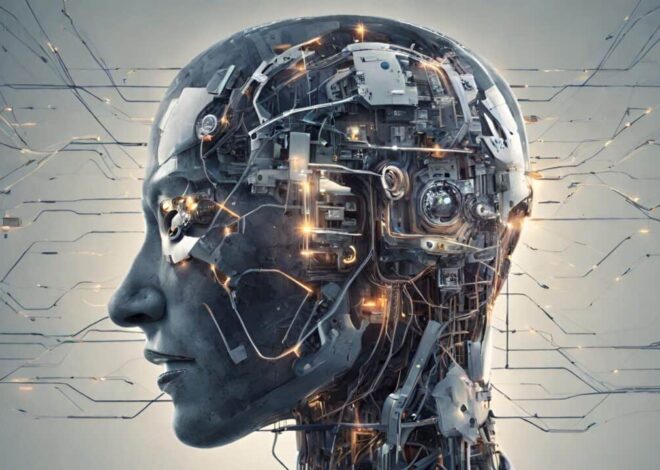
AI Tech: Revolutionizing the Future of Innovation, Work, and Everyday Life
In the last few years, AI tech has evolved from a futuristic concept into a powerful force shaping almost every industry. From healthcare to finance, education to transportation, AI tech is redefining how we live, work, and interact with the world. This transformation isn’t just about automation—it’s about intelligence, efficiency, and limitless possibilities. As we step further into the digital age, understanding the impact and potential of AI tech has never been more important.
1. What is AI Tech?
At its core, AI tech (artificial intelligence technology) refers to machines and systems designed to mimic human intelligence. This includes learning from data, recognizing patterns, making decisions, and even improving over time. Unlike traditional software that only follows programmed instructions, AI tech can adapt, evolve, and find solutions to complex problems.
Some of the most common applications of AI tech include voice assistants, chatbots, facial recognition, recommendation systems, and predictive analytics. But these are just the beginning—new advancements are happening every day.
2. The Growth of AI Tech
The rapid growth of AI tech can be credited to several key factors:
- Data explosion: The world generates massive amounts of data daily, which fuels AI systems to learn and improve.
- Powerful computing: High-performance processors and cloud technology make complex AI models more efficient.
- Open-source innovation: Many companies and developers contribute to AI platforms, speeding up progress.
As a result, AI tech has become more accessible, affordable, and impactful than ever before.
3. AI Tech in the Workplace
One of the most visible impacts of AI tech is in the workplace. Businesses use AI-driven tools to streamline processes, improve decision-making, and boost productivity. For example:
- Customer support: AI chatbots provide 24/7 assistance, reducing human workload.
- Recruitment: AI systems scan resumes and identify the best candidates faster.
- Data analysis: AI tools process massive data sets, providing insights in seconds.
Companies that adopt AI tech gain a competitive edge by saving time, reducing costs, and delivering better services.
4. AI Tech in Healthcare
Healthcare is another area where AI tech is making a major impact. Hospitals and medical institutions are using AI systems to:
- Diagnose diseases more accurately
- Predict patient outcomes
- Streamline administrative tasks
- Support telemedicine
For instance, AI-powered tools can detect early signs of illnesses like cancer through image analysis—sometimes more accurately than human doctors. AI tech is helping save lives and making healthcare more efficient.
5. AI Tech and Education
The education sector is transforming with AI tech. Smart learning platforms personalize lessons for each student, ensuring better understanding and engagement. AI-powered language learning apps help millions of learners worldwide. Additionally, schools and universities use AI to analyze performance data and improve teaching methods.
With AI tech, education is becoming more inclusive and adaptive to individual learning needs.
6. AI Tech in Transportation
Transportation is another industry experiencing the power of AI tech. Self-driving vehicles, traffic prediction systems, and smart logistics are reshaping how goods and people move around the world. Ride-sharing platforms rely on AI tech to match passengers and drivers efficiently.
In the future, AI tech could make transportation safer, cleaner, and faster.
7. AI Tech in Everyday Life
Even without realizing it, most people interact with AI tech daily:
- Voice assistants like Amazon Alexa and Google Assistant
- Personalized recommendations on YouTube or Netflix
- Navigation apps suggesting the best routes
- Smart home devices that adjust lighting and temperature
These conveniences show how AI tech has quietly become part of everyday life, making tasks easier and more efficient.
8. Challenges and Ethical Questions
While AI tech offers enormous potential, it also raises challenges:
- Job displacement: Some roles may be replaced by automation.
- Bias: AI systems can reflect the biases present in their training data.
- Privacy: Collecting and analyzing personal data raises security concerns.
- Ethical decision-making: Can AI be trusted to make moral judgments?
To make the most of AI tech, society must address these issues through regulation, transparency, and responsible innovation.
9. AI Tech and Future Innovation
The future of AI tech looks even more promising. Emerging areas like generative AI, quantum computing, and advanced robotics will push the boundaries of what’s possible. AI will likely become more integrated with our daily lives, driving breakthroughs in science, medicine, education, and beyond.
In coming years, we may see AI tech collaborating with humans more seamlessly, rather than replacing them. The goal will be to enhance human capabilities—not eliminate them.
10. How Businesses Can Benefit from AI Tech
For businesses, adopting AI tech isn’t just a trend—it’s a necessity to stay competitive. Some practical benefits include:
- Automating repetitive tasks
- Improving customer service
- Making smarter, data-driven decisions
- Personalizing user experiences
- Detecting fraud and enhancing security
Companies that embrace AI tech early are more likely to lead their industries in innovation and efficiency.
11. Skills for the AI Tech Era
To thrive in an AI-driven world, individuals need to develop new skills. These include:
- Data literacy
- Critical thinking
- AI and machine learning knowledge
- Problem-solving
- Creativity and emotional intelligence
Learning how AI tech works can help people adapt to changing industries and job requirements.
12. Government and Policy Role in AI Tech
Governments play a key role in regulating AI tech. By setting ethical standards, ensuring data privacy, and promoting fairness, policymakers can encourage innovation while protecting citizens. Many countries are investing heavily in AI research to stay ahead in the global tech race.
13. AI Tech and Environmental Sustainability
AI tech can also support environmental efforts. For example:
- AI systems help monitor climate change and predict natural disasters.
- Smart grids optimize energy use.
- AI improves recycling and waste management systems.
By using AI tech responsibly, we can work toward a more sustainable planet.
14. The Human-AI Collaboration
One of the most exciting aspects of AI tech is human-AI collaboration. Instead of replacing humans, AI enhances human abilities. For example:
- Doctors can make better diagnoses with AI assistance.
- Teachers can personalize lessons more effectively.
- Businesses can make faster, smarter decisions.
The true power of AI tech lies in working with humans, not against them.
15. Conclusion: Embracing the AI Tech Future
AI tech is more than a technological trend—it’s a revolution reshaping the world. It touches every part of our lives, from how we work to how we learn, travel, and connect with each other. While challenges exist, the potential benefits far outweigh the risks if handled wisely.
As innovation continues, embracing AI tech with awareness and responsibility will open doors to a smarter, more efficient, and more connected future.

